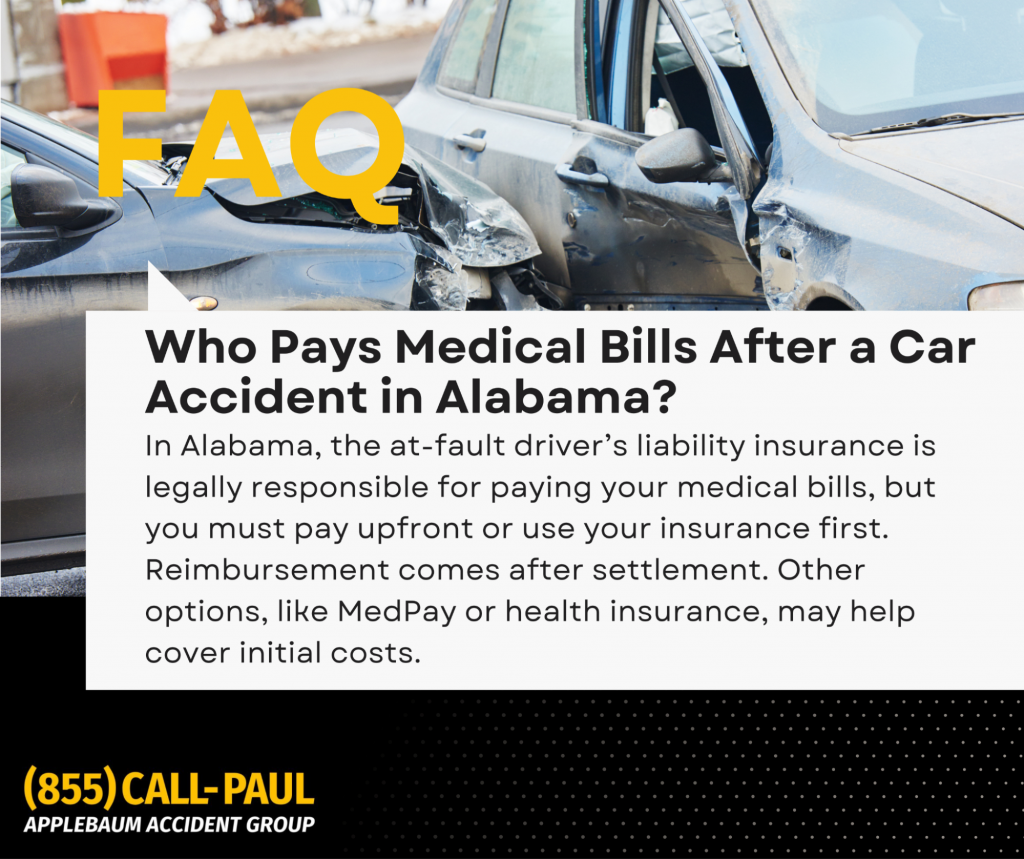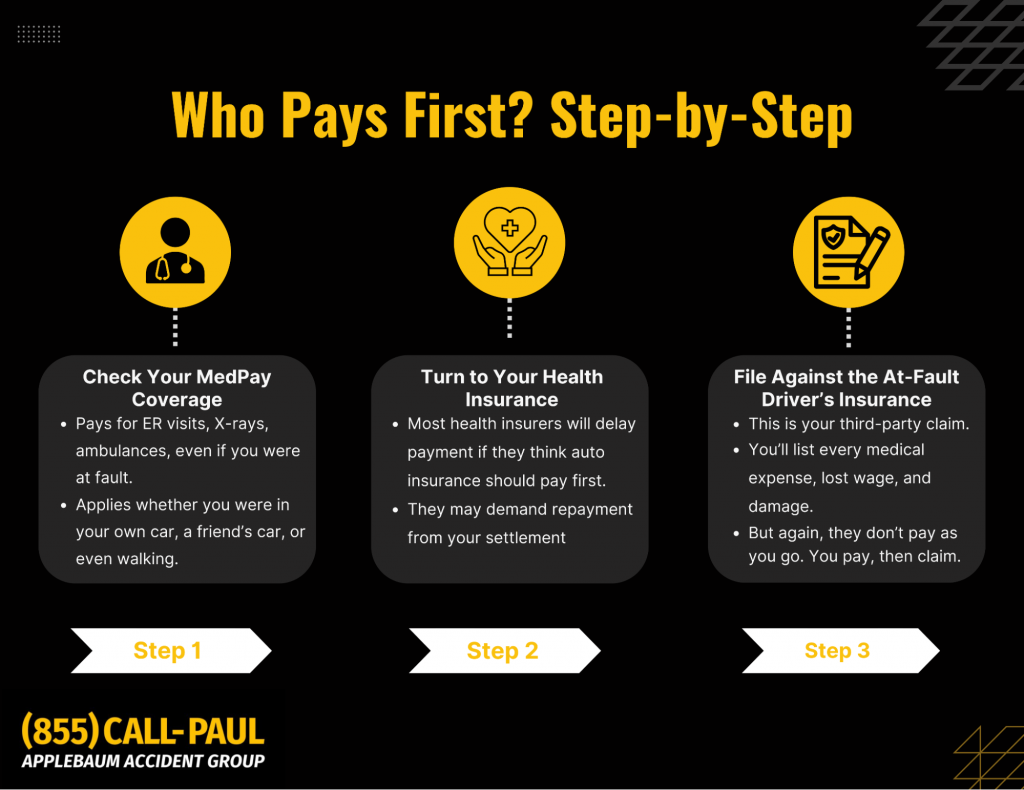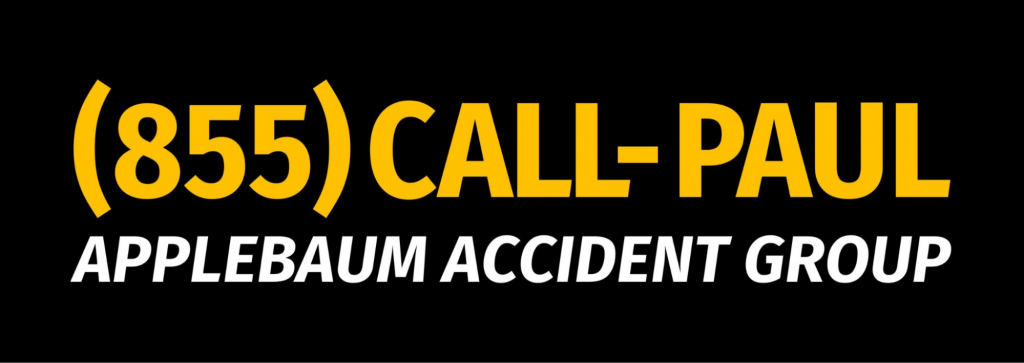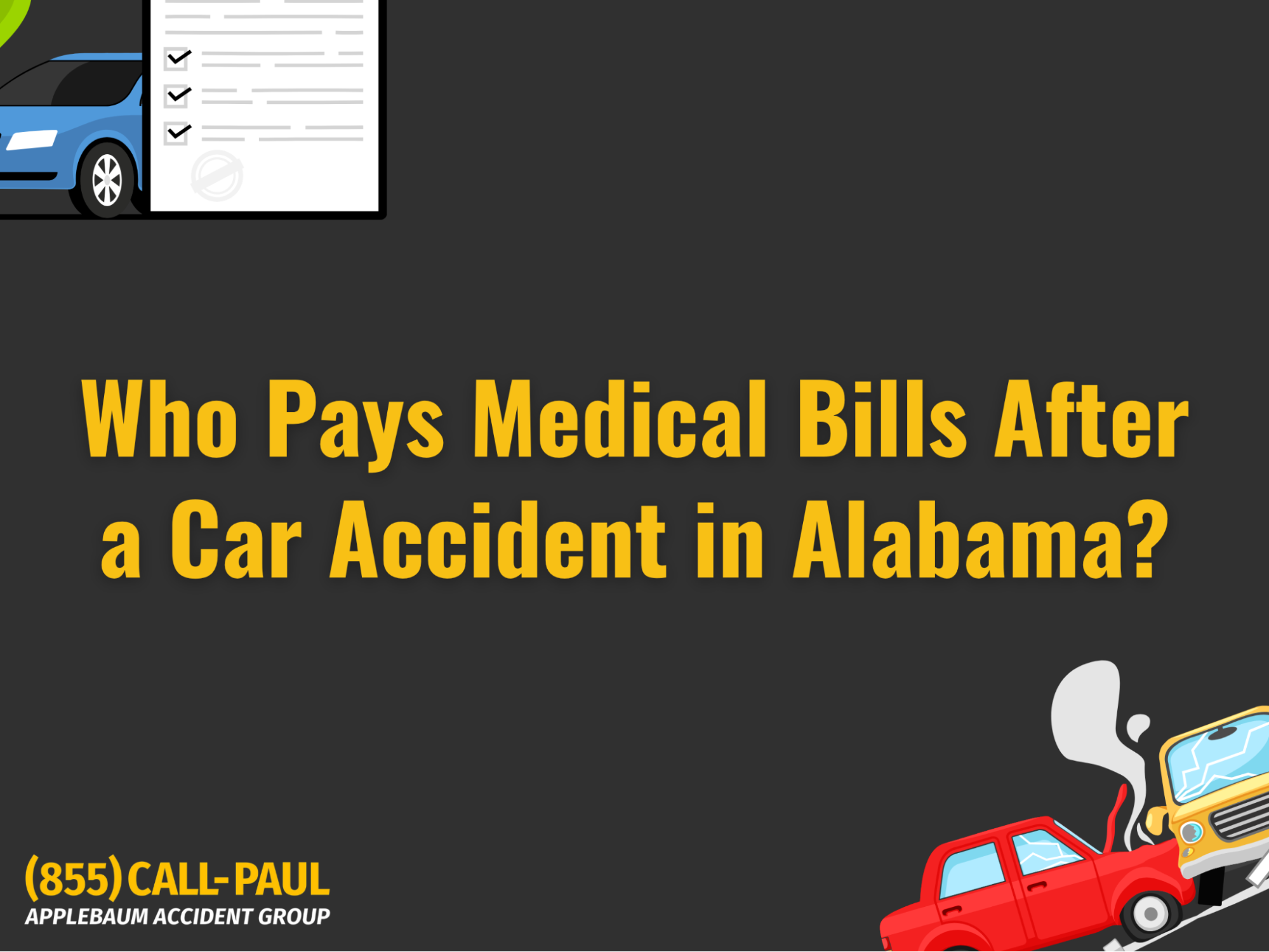In Alabama, the at-fault driver’s liability insurance is legally responsible for paying your medical bills, but you must pay upfront or use your insurance first. Reimbursement comes after settlement. Other options, like MedPay or health insurance, may help cover initial costs.

You’ve just been in a car accident in Alabama. The other driver is clearly at fault. But now you’re opening medical bills addressed to you, and you’re confused, frustrated, maybe even scared.
Here’s the reality: Alabama law puts the burden of payment on the at-fault party, but only after settlement. That means you often have to pay first, then wait to get reimbursed.
In this article, you’ll learn:
- How Alabama’s liability system affects who pays
- When and how your own insurance steps in
- Why hospitals charge you first (even when it’s not your fault)
- What to do if the other driver is uninsured
- How to protect yourself from costly mistakes
Alabama’s Fault Rules and Why You’re Still Getting Billed
In Alabama, the law says the person who caused the accident is responsible for the damage, including your medical bills. That’s because Alabama follows a pure fault system.
So why are you still the one being billed?
Here’s why:
- The at-fault driver’s insurer doesn’t pay bills directly. You cover expenses first, and request reimbursement through a claim.
- Alabama’s contributory negligence standard is harsh. If you’re even 1% responsible for the crash, you may lose the right to any compensation at all.
- Insurers wait to pay until there’s a settlement or court judgment, often months later.
What that means for you: Even if fault is obvious, the system is built to delay payouts, and you’re left handling the bills in the meantime.
Who Actually Pays First? Step-by-Step
If you’ve never dealt with a car crash before, here’s what often happens, and what you can do about it.

Step 1: Check Your MedPay Coverage
- MedPay (Medical Payments coverage) is optional in Alabama but extremely useful.
- It pays for ER visits, X-rays, ambulances, even if you were at fault.
- It applies whether you were in your own car, a friend’s car, or even walking.
Many people don’t realize MedPay can also cover pedestrians and cyclists, not just drivers or passengers. If you want to see how uninsured motorist claims work in another state with similar insurance structures, this Step-by-Step Guide to Filing an Uninsured Motorist Claim in Florida can help you.
Step 2: Turn to Your Health Insurance
- After MedPay is exhausted (or if you don’t have it), your health plan may help.
- But most health insurers will delay payment if they think auto insurance should pay first.
- They may later demand repayment from your settlement through a legal process called subrogation.
Watch out: Just because health insurance steps in doesn’t mean you’re off the hook permanently.
Step 3: File Against the At-Fault Driver’s Insurance
- This is your third-party claim.
- You’ll list every medical expense, lost wage, and damage.
- But again, they don’t pay as you go. You pay, then claim.
Tip: Keep everything. Doctor bills, ER notes, prescriptions, therapy sessions, even gas receipts if you drove to appointments. Every dollar counts in the final claim.
Missteps That Can Leave You With More Bills
Even well-informed people get tripped up by how Alabama’s fault system works. These three missteps show up in nearly every case we see.
“The other driver’s insurance will pay the hospital directly.”
That’s the biggest myth. In reality, you’re financially responsible from day one. The insurer might pay you back, but that doesn’t stop hospitals from billing you or sending the account to collections.
“I thought the hospital would handle it with the at-fault insurer.”
Nope. Most providers don’t bill the auto insurer directly. Instead, they charge you, no matter what paperwork you provided. Then you’re left dealing with the balance or the debt collectors.
“I have health insurance, they’ll take care of it.”
Maybe, maybe not. Most health plans try to push payment responsibility onto your auto insurer. Many people find that claims are delayed or denied outright until the accident claim resolves.
What If the At-Fault Driver Has No or Low Insurance?
Alabama only requires drivers to carry $25,000 in bodily injury coverage per person. That might cover a few ambulance rides and a short ER stay, but serious injuries can easily exceed that limit.
If the other driver has no insurance at all, or just the minimum, here’s what you can do:
- Uninsured/Underinsured Motorist (UM/UIM) coverage: If you have it, this can help bridge the gap. It steps in when the other party’s insurance is missing or insufficient.
- Lawsuit against the at-fault driver: You can sue for the remaining costs, but unless they have assets or income, collecting may be difficult.
- Fallback to MedPay and health insurance: Your own insurance may cover the difference, though timing and subrogation can complicate this.
Common question: Can you get reimbursed if you’ve already paid out of pocket?
Answer: Yes, but you’ll need to include every receipt and billing statement in your final claim.
What Medical Costs Are Covered?
Auto insurance claims can cover far more than just the ER visit, if you know what to include. Here’s what can be recovered when properly documented:
- Emergency transport and treatment
- Surgical procedures, physical therapy, and follow-up care
- Prescription medication and medical equipment
- Mental health services, including therapy for trauma or anxiety
- Lost income during your recovery (through your injury claim, not directly via health insurance)
In emotionally complex cases, like those involving PTSD or anxiety, your records can play a pivotal role: something explored in this breakdown of mental health documentation in Florida injury claims: Why Mental Health Records Matter in Your Florida Injury Claim
Tip: If your doctor recommends long-term treatment or future surgery, get that in writing. Future costs are valid in a claim, but only with professional documentation.
FAQs from Real People in Alabama
Can I negotiate medical bills after a settlement? Yes. If providers filed a lien, your attorney may be able to reduce what you owe before distributing the settlement.
What if my own insurance already paid, can I still file a claim? Yes. But your health insurer may request reimbursement if they fronted the money for accident-related care.
What happens if I was walking or biking, not in a car? Your own auto policy may still protect you. MedPay and UM/UIM often extend to pedestrians and cyclists.
Why did my insurer randomly say I was 25% at fault? Insurers sometimes assign partial fault to reduce payouts. You can challenge this with photos, police reports, or witness statements.
Avoid These Pitfalls
These are the traps we see car accident victims fall into most often. Many are avoidable, with the right guidance.
- Waiting too long for the other insurer to pay: Use your MedPay or health insurance early. You don’t need to wait for someone else’s carrier to accept liability.
- Failing to document everything: Medical bills, pharmacy receipts, mileage for doctor visits, anything connected to your injury matters.
- Ignoring liens: If you’re using health insurance, they may place a lien on your future settlement. Your attorney can often negotiate the final amount.
- Worrying when collections start calling: It happens often. Many providers send unpaid bills to collections even before liability is resolved. Legal help can delay or reduce these.
Client concern: “I’m afraid to sue because the other driver is a friend.”
Solution: It’s their insurance that pays, not them directly. Most people don’t even get personally involved unless the policy doesn’t cover the damage.
What to Do Right Now If You’re Injured in Alabama
- Seek medical care immediately. Delays can hurt your health, and your claim.
- File a claim with your own insurer (check for MedPay and UM/UIM coverage).
- Use health insurance if necessary, but keep track of what they pay.
- Save every receipt, invoice, and medical record.
- Consult a professional to review policy language, coverage options, and insurer tactics.
Even if you’re not at fault, you’re still the one left navigating the system, and that’s where most people feel overwhelmed.
Get Legal Support Before the Bills Take Over

If you’re reading this, you’re likely facing the same question thousands of accident victims in Alabama face every year: “How do I pay these medical bills when I wasn’t even at fault?”
That’s where Applebaum Accident Group steps in, not as a law firm, but as the connector between you and the legal professionals who know how to fix this.
Here’s how we help:
- We match you with the right attorney, someone who’s experienced in Alabama car accident claims and understands your situation.
- We help you avoid delays by referring you to attorneys who move fast, know local rules, and won’t let insurers lowball you.
- We connect you to providers who understand accident cases, so you’re not left explaining MedPay or liens on your own./
👉Contact Applebaum Accident Group and we’ll connect you with the right lawyer, fast, confidential, and focused on protecting your future.





